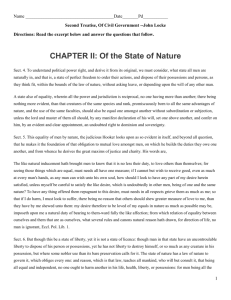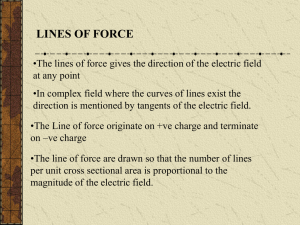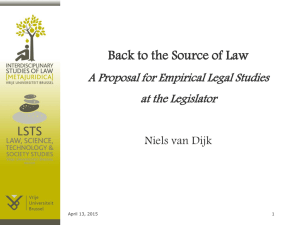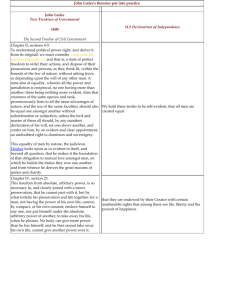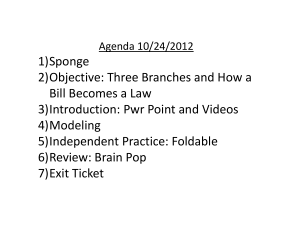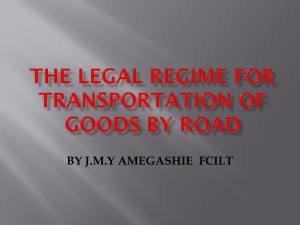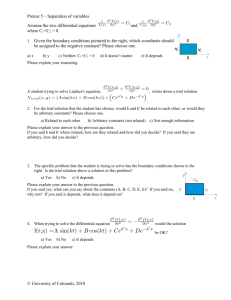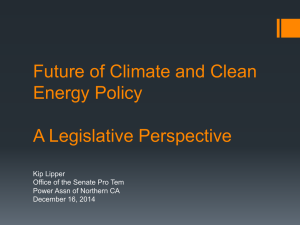Human laws are measures in respect of men whose actions they
advertisement
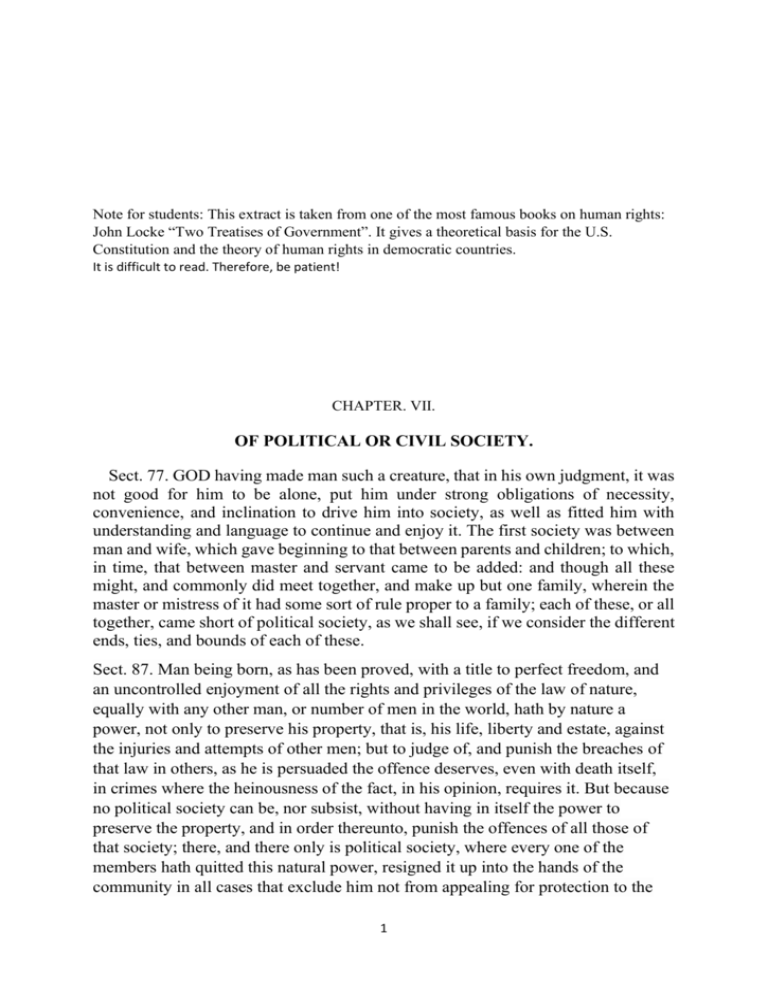
Note for students: This extract is taken from one of the most famous books on human rights: John Locke “Two Treatises of Government”. It gives a theoretical basis for the U.S. Constitution and the theory of human rights in democratic countries. It is difficult to read. Therefore, be patient! CHAPTER. VII. OF POLITICAL OR CIVIL SOCIETY. Sect. 77. GOD having made man such a creature, that in his own judgment, it was not good for him to be alone, put him under strong obligations of necessity, convenience, and inclination to drive him into society, as well as fitted him with understanding and language to continue and enjoy it. The first society was between man and wife, which gave beginning to that between parents and children; to which, in time, that between master and servant came to be added: and though all these might, and commonly did meet together, and make up but one family, wherein the master or mistress of it had some sort of rule proper to a family; each of these, or all together, came short of political society, as we shall see, if we consider the different ends, ties, and bounds of each of these. Sect. 87. Man being born, as has been proved, with a title to perfect freedom, and an uncontrolled enjoyment of all the rights and privileges of the law of nature, equally with any other man, or number of men in the world, hath by nature a power, not only to preserve his property, that is, his life, liberty and estate, against the injuries and attempts of other men; but to judge of, and punish the breaches of that law in others, as he is persuaded the offence deserves, even with death itself, in crimes where the heinousness of the fact, in his opinion, requires it. But because no political society can be, nor subsist, without having in itself the power to preserve the property, and in order thereunto, punish the offences of all those of that society; there, and there only is political society, where every one of the members hath quitted this natural power, resigned it up into the hands of the community in all cases that exclude him not from appealing for protection to the 1 law established by it. And thus all private judgment of every particular member being excluded, the community comes to be umpire, by settled standing rules, indifferent, and the same to all parties; and by men having authority from the community, for the execution of those rules, decides all the differences that may happen between any members of that society concerning any matter of right; and punishes those offences which any member hath committed against the society, with such penalties as the law has established: whereby it is easy to discern, who are, and who are not, in political society together. Those who are united into one body, and have a common established law and judicature to appeal to, with authority to decide controversies between them, and punish offenders, are in civil society one with another: but those who have no such common appeal, I mean on earth, are still in the state of nature, each being, where there is no other, judge for himself, and executioner; which is, as I have before showed it, the perfect state of nature. OF THE EXTENT OF THE LEGISLATIVE POWER. Sect. 134. THE great end of men's entering into society, being the enjoyment of their properties in peace and safety, and the great instrument and means of that being the laws established in that society; the first and fundamental positive law of all commonwealths is the establishing of the legislative power; as the first and fundamental natural law, which is to govern even the legislative itself, is the preservation of the society, and (as far as will consist with the public good) of every person in it. This legislative is not only the supreme power of the commonwealth, but sacred and unalterable in the hands where the community have once placed it; nor can any edict of any body else, in what form soever conceived, or by what power soever backed, have the force and obligation of a law, which has not its sanction from that legislative which the public has chosen and appointed: for without this the law could not have that, which is absolutely necessary to its being a law,* the consent of the society, over whom no body can have a power to make laws, but by their own consent, and by authority received from them; and therefore all the obedience, which by the most solemn ties any one can be obliged to pay, ultimately terminates in this supreme power, and is directed by those laws which it enacts: nor can any oaths to any foreign power whatsoever, or any domestic subordinate power, discharge any member of the society from his obedience to the legislative, acting pursuant to their trust; nor oblige him to any obedience contrary to the laws so enacted, or farther than they do allow; it being ridiculous to imagine one can be tied ultimately to obey any power in the society, which is not the supreme. Sect. 135. Though the legislative, whether placed in one or more, whether it be always in being, or only by intervals, though it be the supreme power in every commonwealth; yet: 2 First, It is not, nor can possibly be absolutely arbitrary over the lives and fortunes of the people: for it being but the joint power of every member of the society given up to that person, or assembly, which is legislator; it can be no more than those persons had in a state of nature before they entered into society, and gave up to the community: for no body can transfer to another more power than he has in himself; and no body has an absolute arbitrary power over himself, or over any other, to destroy his own life, or take away the life or property of another. A man, as has been proved, cannot subject himself to the arbitrary power of another; and having in the state of nature no arbitrary power over the life, liberty, or possession of another, but only so much as the law of nature gave him for the preservation of himself, and the rest of mankind; this is all he doth, or can give up to the commonwealth, and by it to the legislative power, so that the legislative can have no more than this. Their power, in the utmost bounds of it, is limited to the public good of the society. It is a power, that hath no other end but preservation, and therefore can never have a right to destroy, enslave, or designedly to impoverish the subjects.* The obligations of the law of nature cease not in society, but only in many cases are drawn closer, and have by human laws known penalties annexed to them, to enforce their observation. Thus the law of nature stands as an eternal rule to all men, legislators as well as others. The rules that they make for other men's actions, must, as well as their own and other men's actions, be conformable to the law of nature, i.e. to the will of God, of which that is a declaration, and the fundamental law of nature being the preservation of mankind, no human sanction can be good, or valid against it. Sect. 136. Secondly, The legislative, or supreme authority, cannot assume to its self a power to rule by extemporary arbitrary decrees, but is bound to dispense justice, and decide the rights of the subject by promulgated standing laws, and known authorized judges:* for the law of nature being unwritten, and so no where to be found but in the minds of men, they who through passion or interest shall miscite, or misapply it, cannot so easily be convinced of their mistake where there is no established judge: and so it serves not, as it ought, to determine the rights, and fence the properties of those that live under it, especially where every one is judge, interpreter, and executioner of it too, and that in his own case: and he that has right on his side, having ordinarily but his own single strength, hath not force enough to defend himself from injuries, or to punish delinquents. To avoid these inconveniences, which disorder men's propperties in the state of nature, men unite into societies, that they may have the united strength of the whole society to secure and defend their properties, and may have standing rules to bound it, by which every one may know what is his. To this end it is that men give up all their natural power to the society which they enter into, and the community put the legislative power into such hands as they think fit, with this trust, that they shall be governed by declared laws, or else their peace, quiet, and property will still be at the same uncertainty, as it was in the state of nature. (*Human laws are measures in respect of men whose actions they must direct, howbeit such measures they are as have also their higher rules to be measured by, 3 which rules are two, the law of God, and the law of nature; so that laws human must be made according to the general laws of nature, and without contradiction to any positive law of scripture, otherwise they are ill made. Hooker's Eccl. Pol. l. iii. sect. 9. Sect. 137. Absolute arbitrary power, or governing without settled standing laws, can neither of them consist with the ends of society and government, which men would not quit the freedom of the state of nature for, and tie themselves up under, were it not to preserve their lives, liberties and fortunes, and by stated rules of right and property to secure their peace and quiet. It cannot be supposed that they should intend, had they a power so to do, to give to any one, or more, an absolute arbitrary power over their persons and estates, and put a force into the magistrate's hand to execute his unlimited will arbitrarily upon them. This were to put themselves into a worse condition than the state of nature, wherein they had a liberty to defend their right against the injuries of others, and were upon equal terms of force to maintain it, whether invaded by a single man, or many in combination. Whereas by supposing they have given up themselves to the absolute arbitrary power and will of a legislator, they have disarmed themselves, and armed him, to make a prey of them when he pleases; he being in a much worse condition, who is exposed to the arbitrary power of one man, who has the command of 100,000, than he that is exposed to the arbitrary power of 100,000 single men; no body being secure, that his will, who has such a command, is better than that of other men, though his force be 100,000 times stronger. And therefore, whatever form the commonwealth is under, the ruling power ought to govern by declared and received laws, and not by extemporary dictates and undetermined resolutions: for then mankind will be in a far worse condition than in the state of nature, if they shall have armed one, or a few men with the joint power of a multitude, to force them to obey at pleasure the exorbitant and unlimited decrees of their sudden thoughts, or unrestrained, and till that moment unknown wills, without having any measures set down which may guide and justify their actions: for all the power the government has, being only for the good of the society, as it ought not to be arbitrary and at pleasure, so it ought to be exercised by established and promulgated laws; that both the people may know their duty, and be safe and secure within the limits of the law; and the rulers too kept within their bounds, and not be tempted, by the power they have in their hands, to employ it to such purposes, and by such measures, as they would not have known, and own not willingly. Sect. 138. Thirdly, The supreme power cannot take from any man any part of his property without his own consent: for the preservation of property being the end of government, and that for which men enter into society, it necessarily supposes and requires, that the people should have property, without which they must be supposed to lose that, by entering into society, which was the end for which they entered into it; too gross an absurdity for any man to own. Men therefore in society having property, they have such a right to the goods, which by the law of the community are their's, that no body hath a right to take their substance or any part of it from 4 them, without their own consent: without this they have no property at all; for I have truly no property in that, which another can by right take from me, when he pleases, against my consent. Hence it is a mistake to think, that the supreme or legislative power of any commonwealth, can do what it will, and dispose of the estates of the subject arbitrarily, or take any part of them at pleasure. This is not much to be feared in governments where the legislative consists, wholly or in part, in assemblies which are variable, whose members, upon the dissolution of the assembly, are subjects under the common laws of their country, equally with the rest. But in governments, where the legislative is in one lasting assembly always in being, or in one man, as in absolute monarchies, there is danger still, that they will think themselves to have a distinct interest from the rest of the community; and so will be apt to increase their own riches and power, by taking what they think fit from the people: for a man's property is not at all secure, tho' there be good and equitable laws to set the bounds of it between him and his fellow subjects, if he who commands those subjects have power to take from any private man, what part he pleases of his property, and use and dispose of it as he thinks good. 5
